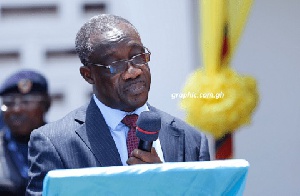The Commissioner General of the Ghana Revenue Authority (GRA), Mr. Emmanuel Kofi Nti, is upbeat about government generating the right revenue from the telcos if Kelni GVG commences operation.
The controversial contract worth 89 million dollar for five years is expected to start on June 11, 2018. Kelni GVG will operate a common platform that would monitor in real time the activities of telcos in Ghana to ensure that government is not shortchanged in getting the right taxes.
Mr. Emmanuel Kofi Nti told journalists hitherto, the telecommunications operators decide what they want to pay to government by way of tax.
“We are at the beck and call of the industry, whatever they give us is what we take, that is a very serious risk,” the GRA boss said at a media briefing Friday.
“We have to be able to determine the real thing for ourselves and not to be dictated to by the industry,” he defended the need for the common platform.
Underpaying
Minister of Communications, Ursula Owusu-Ekuful intimated that the government had no means of checking if information provided by the telcos was “accurate”.
According to her, it has been proven that network operators in Ghana have not always provided all the information that they ought to provide.
“In 2012 the NCA (National Communications Authority) did an audit of the 1% of the revenues that they are supposed to be paying to the NCA.”
It was discovered that “all the telcos have been under declaring and underpaying the 1% of the revenue they were required to pay,” she revealed.
“It is imperative that we hold their feet to the fire, so to speak, and crosscheck all the information they provide…it’s legitimate government takes its cut from the money they make,” Mrs. Owusu-Ekuful justified the need for Kelni GVG deal.
The minister reiterated that unlike the previous contract with Subah, whatever would be paid Kelni GVG would lead to government being the eventual owner of the monitoring equipment.
The about 150 million dollars government paid to Subah, she said, was service fees and not for owning the equipment.
Obsolete equipment
Critics of the contract have also argued that whatever equipment that would be handed over to Ghana by Kelni GVG at the end of the contract would be obsolete.
But Mrs. Owusu-Ekuful has assured Ghanaians that at the end of the contract, the company is obliged to install new equipment.
“The contract is structured in a way that at the end of the first 5 years period the entire equipment would be upgraded, replaced, it may be software upgrade, the latest of every technology would be installed by the vendor at no extra cost [to government], it is also included in the fee we are paying that we get a total system replacement at the end of the five years.
“So if we decide at that time of the contract that we are not going to continue with the contract, we get spanking new equipment that the NCA, GRA can continue to work with.”
Business News of Monday, 4 June 2018
Source: 3news.com

















